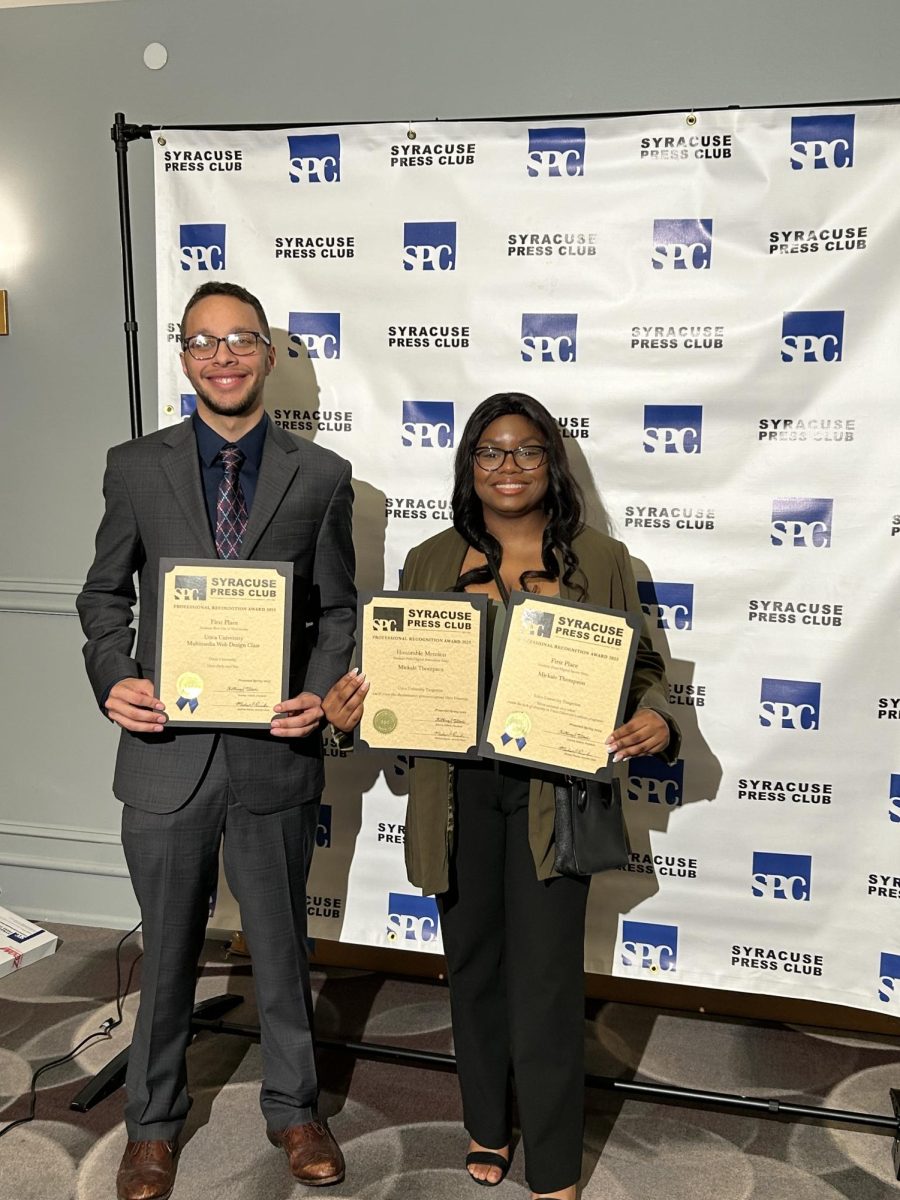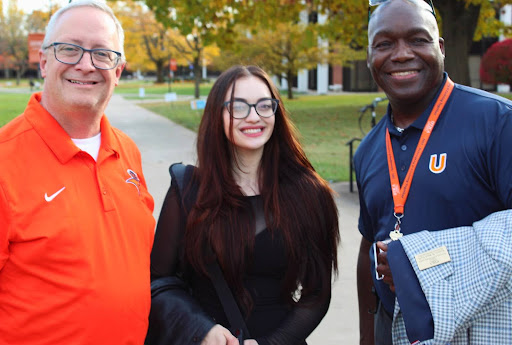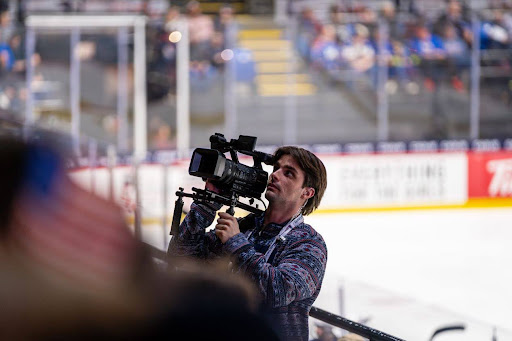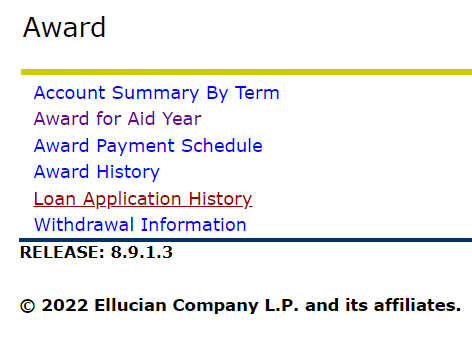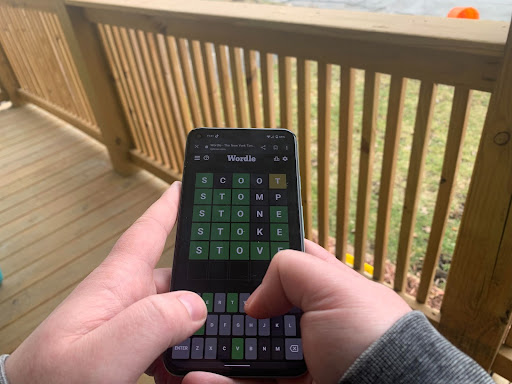Samuel Northrup, Editor in Chief
NFL teams endure the trials and tribulations of a 16-game season on an annual basis, captivating troves of emotionally and fiscally invested fans along with them. But this Sunday was no ordinary one, with all eyes turning toward team owners, coaches and players during a pre-game ritual that until last year garnered little national attention.
Teams across the country and in London took part in mass demonstrations for unity following comments from President Donald Trump urging team owners to fire players that have sat or knelt during the national anthem that is played prior to games beginning at a rally in Huntsville, Alabama on Sept. 22. Trump also encouraged fans to leave during games.
“Wouldn’t you love to see one of these NFL owners when somebody disrespects our flag to say, ‘Get that son of a bitch off the field right now, out, he’s fired. He’s fired!” Trump said, according to CNN.
The first of 14 Sunday matchups saw coaches, players and one owner from the Jacksonville Jaguars and Baltimore Ravens, playing at Wembley Stadium in London as part of an effort to promote the NFL brand overseas, kneeling and standing while locking arms during the performing of the national anthem. The remaining teams followed suit.
Political science professor at Utica College Daniel Tagliarina notes that while Trump’s comments “were a little out there,” this was not the first time the president and the NFL have crossed paths.
“It is interesting to have a president go after the NFL,” he said. “But even before he was a candidate he’s had a bit of a long term gripe with the NFL, so it’s kind of consistent with that, it’s just odd coming from a president.”
From 1984-85, Trump had controlling interest in the New Jersey Generals of the United States Football League (U.S.F.L.), which notably folded following a Trump-lead antitrust lawsuit against the NFL Most recently, he placed an unsuccessful bid to purchase the Buffalo Bills in 2014.
The timing of Trump’s comments is in question due to continuing national media coverage ranging from ongoing conflicts with North Korea, devastation from Hurricane Maria in Puerto Rico and the Sunday night announcement of an expanded travel ban from the White House.
Political scientists, Tagliarina says, are undecided on whether the remarks serve as a diversion of media coverage to anthem protests or if the president is just outwardly voicing his opinion.
“There are times that it (Trump’s comments) definitely feels that way (like a diversion), but there also are times it feels, especially with his Twitter account, that he’s just tweeting about whatever he’s watching or whatever is on his mind at the time,” Tagliarina said. “So, it could be intentional distraction, but I think it’s much more in-the-moment, visceral reactions to what is happening.”
Tagliarina also points to the origin of the anthem protests, ex-San Francisco 49ers quarterback Colin Kaepernick, and how the goal of bringing attention to social injustice and police brutality has shifted to responding to the president’s comments.
“With Trump’s attack on the NFL, it has now spun into something else, but it’s still supposed to be about racial equality in the country, at least from the perspective of a lot of players,” Tagliarina said.
Since the Sunday demonstrations, national news outlets, like CNN and FOX News, have focused coverage on the NFL as Trump has carried on his criticism by taking to Twitter.
“Ratings for NFL football are way down except before game starts, when people tune in to see whether or not our country will be disrespected!” he tweeted on Tuesday.
Adjunct lecturer at UC Jason Powles believes players should stand for the anthem but respects their rights to demonstrate. As the current anchor for the morning and noon news at WKTV in Utica, he understands the process media outlets go through when covering nationally controversial stories.
“What the mainstream media does, quite often, is they jump on a story and they roll with it,” Powles said. “Could it have just been a statement and move on with it, yes, but because the president is involved, and he’s controversial, and you have the other side of things involved, and that’s controversial, the media swarms to it like bees to a hive.”
Powles, previously the sports director and anchor for WKTV, feels most fans are more concerned about the games themselves then the rising social issues surrounding the national anthem.
“The more you feed into it, the more it becomes a story,” he said. “I think the average Joe doesn’t care. They want to watch sports, they appreciate what the players are doing, they (players) make the statement and they (fans) move on. In the media, we do it all the time, we just get the train rolling, it goes down the tracks and it gets harder and harder to stop.”
While anthem demonstrations were widely adopted for the first time across the league, fans remain divided on these actions as evidenced by mixtures of cheers and boos that could be heard coming from stands during network broadcasts of Sunday’s games.
Response from UC’s campus was no different.
Sophomore David Junath feels players “have the right to do things like that,” adding both sides, the president and the NFL, need to have “thicker skin.”
“When I stand up, I think of them (members of the military),” he said. “So I think it’s disrespectful to do that to the troops. It’s kind of like a double-edged sword. They (troops) fight for that right, so they (NFL players) have the right to kneel for it, but I think at the end of the day you need to stand for it, and I don’t think you should kneel because you don’t like what the president has to say.”
Senior Yana Garcia says she tries to understand both sides of the issue, including the symbolism of the American flag, but also supports the protests’ original goal set by Kaepernick to speak out on social injustice.
“I get it, I’m all for it, people saying ‘This is my flag, respect it,’” she said. “Got it, but you’re not being oppressed. No one is telling African-Americans and blacks how to do this in a matter of where it will be peaceful. We walk down any street and we start protesting, but we’re ‘causing a riot.’”
Concerned about perspective, Garcia wants proponents of standing during the anthem to understand the purpose of players’ protests.
“Right now, our country is at a point where you would be blind to say it isn’t divided, and it is divided,” Garcia said. “That song (the national anthem) may mean a lot to somebody who’s never been oppressed, whose never had to walk down the street and look behind their back and wonder, ‘If a cop stops me, will I live?’”
Director of Physical Education and Athletics David Fontaine feels that people, including athletes at UC, have the right to protest peacefully.
“We’re seeing a peaceful protest that resonates with the country, and to see professional athletes take a knee or not stand during our national anthem certainly gets people’s attention,” he said. “I think that is a major reason why we are seeing this in sports.”
If similar demonstrations were held at UC, Fontaine says “it is not my place to say they can’t” and only hopes that athletes understand “what they are doing before they take a knee just because it is trendy.”
“People are always going to have issue with things against the grain,” Fontaine said. “If we were going to do it (demonstrate) here, I hope we can do it in a way which will bring the attention that one wants to bring. I hope it shows that they (athletes) are allowed to express themselves for what they believe in but in a way that won’t cause violence. It would be counterproductive if we sent the wrong message. Teams are doing this to bring awareness to injustices and not create more violence.”
Pioneers head football coach Blaise Faggiano likes the message of unity from the in NFL by linking arms and says his team has not discussed demonstrating.
“As a leader, it’s not for me to give my opinion, people have the right to protest, people have the right to burn burn the flag,” he said. “It’s the beauty of our country.”
Student-athlete opinions on anthem demonstrations vary.
“I completely understand and agree with the stances of NFL players who choose to kneel during the anthem,” said James McNeill, a sophomore basketball player. “The meaning behind the flag is not what it is perceived to be and represents a part of a history this country continues to ignore. The repetitive oppression shown against African-Americans. And the protest should continue until change is made.”
McNeill is willing to take a knee but only with the approval of his coach.
Carl Taylor, also a member of the basketball team, feels NFL franchises protesting as a team send a message of unity but does not feel the president’s comments should be the motivation.
“You will not see me kneeling before our games,” he said. “I believe my hands behind my back gets the message across.”
Contributing: Sports Editor Zach Thomann and Assistant Sports Editor Christian Rodriguez

